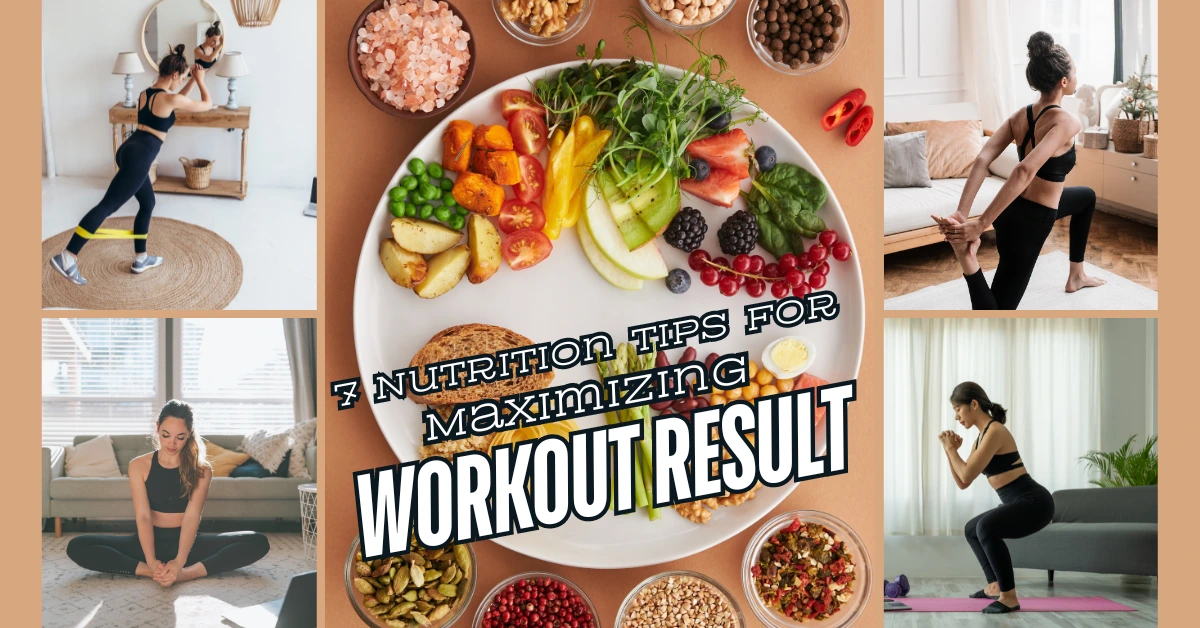
7 Nutrition Tips for Maximizing Workout Results
- 136
- 0
- 0
Nutrition tips are essential for maximizing workout results because they fuel your body for exercise. Eating the right foods provides energy, helps with recovery, and builds muscle. Proper nutrition ensures you have the strength to perform well during workouts and supports your overall health. After exercising, consuming the right nutrients helps your muscles recover and grow. Staying hydrated is also crucial, as it keeps you energized and aids in performance. Overall, good nutrition complements your fitness routine, making it easier to reach your goals and feel great.
7 Nutrition Tips for Maximizing Workout Results
Are you going to the gym consistently but not achieving the results you desire? The secret to getting the most out of your workouts might be on your plate, not just in the weight room. Good nutrition is key to powering your exercises and helping your body recover and grow stronger. Here are seven nutrition tips for maximizing workout results that can help you get the best results from your workouts.
Eat Enough Protein
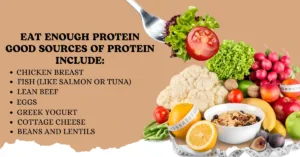
Protein is super important for anyone who works out regularly. It helps build and repair muscles, which is exactly what you need after a tough gym session.
How much protein do you need? A good rule of thumb is to aim for about 1.6 to 2.2 grams of protein per kilogram of body weight per day. So, if you weigh 70 kg (about 154 pounds), you should try to eat between 112 to 154 grams of protein daily.
Good sources of protein include:
- Chicken breast
- Fish (like salmon or tuna)
- Lean beef
- Eggs
- Greek yogurt
- Cottage cheese
- Tofu and tempeh (for vegetarians and vegans)
- Beans and lentils
Aim to distribute your protein intake evenly throughout the day. Eating some protein with each meal and snack can help keep your muscles fed and happy.
Don’t Skip Carbs
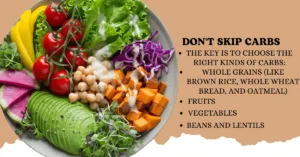
Some people think carbs are bad, but that’s not true, especially if you work out a lot. Carbohydrates are the primary energy source for your body. They power your workouts and assist in recovery afterward.
The key is to choose the right kinds of carbs:
- Whole grains (like brown rice, whole wheat bread, and oatmeal)
- Fruits
- Vegetables
- Beans and lentils
These foods give you energy and also provide fiber, vitamins, and minerals. Try to eat some carbs before your workout for energy, and some after to help your body recover.
How many carbs you need depends on how much you work out. If you exercise for an hour or more most days, you might need 5-7 grams of carbs per kilogram of body weight daily. For our 70 kg person, that’s 350-490 grams of carbs a day.
Don’t Fear Fats
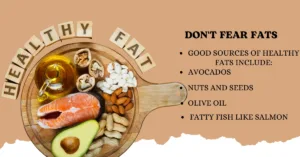
Healthy fats are important too. They help your body absorb certain vitamins, keep your hormones balanced, and can even help reduce inflammation after hard workouts.
Good sources of healthy fats include:
- Avocados
- Nuts and seeds
- Olive oil
- Fatty fish like salmon
- Eggs
Aim for about 0.5-1 gram of fat per kilogram of body weight daily. For our 70 kg person, that’s 35-70 grams of fat per day.
Remember, fats have more calories per gram than protein or carbs, so a little goes a long way. Don’t overdo it, but don’t avoid fats either.
Time Your Meals Right
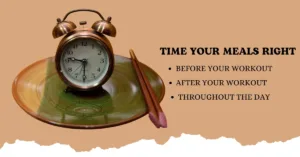
The timing of your meals can be just as crucial as the food you choose. Here are some tips for when to eat:
Before Your Workout: Eat a meal with carbs and some protein about 2-3 hours before you exercise. This gives your body time to digest and use that food for energy. If you’re short on time, a small snack about 30 minutes before your workout can help. Try a banana with a spoonful of peanut butter, or a small handful of trail mix.
After Your Workout: Try to eat within 30 minutes to an hour after finishing your workout. This meal or snack should have both protein (to help repair and build muscle) and carbs (to replace the energy you use). Good options include a protein shake with a piece of fruit or a turkey sandwich on whole-grain bread.
During the Day: Distribute your meals and snacks evenly across the day. This keeps your energy levels steady and provides a constant supply of nutrients to your muscles.
Stay Hydrated
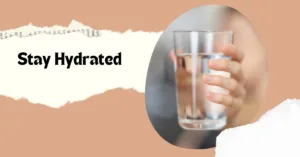
Water is crucial for every part of your workout. It helps control your body temperature, moves nutrients to your muscles, and helps get rid of waste products.
How much water do you need? A general rule is to drink about 3-4 liters (about 13-17 cups) of water per day for men, and 2.2-3 liters (about 9-13 cups) for women. But if you’re working out a lot or it’s hot outside, you might need more.
Here are some hydration tips:
- Stay hydrated by drinking water throughout the day, not only during your workouts.
- Have a glass of water with each meal and snack.
- Keep a water bottle handy and take sips from it throughout the day.
- If you’re exercising for more than an hour, or it’s very hot, you might need a sports drink to replace electrolytes lost through sweat.
Remember, if you feel thirsty, you’re already a bit dehydrated. Try to drink water before you feel thirsty.
Eat Your Fruits and Vegetables
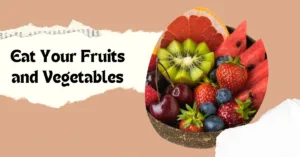
Fruits and veggies are packed with vitamins, minerals, and antioxidants that help your body work at its best. These nutrients can help you recover faster from workouts and might even help prevent injuries.
Try to fill half of your plate with fruits and vegetables at every meal. Try to eat a variety of colors – each color provides different nutrients. Here are some workout-friendly options:
- Leafy greens like spinach and kale (rich in iron, which helps carry oxygen to your muscles)
- Berries (packed with antioxidants to help with recovery)
- Bananas are a great source of potassium, which can help reduce the risk of muscle cramps.
- Sweet potatoes are high in carbohydrates and vitamins.
- Bell peppers (high in vitamin C, which helps repair tissues)
Don’t hesitate to experiment with different fruits and vegetables. The more variety you have, the more different nutrients you’ll get.
Consider Supplements (But Food Comes First)
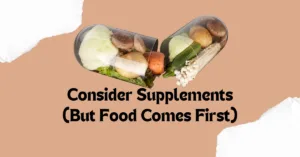
While a good diet should give you most of the nutrients you need, some people find supplements helpful. Here are a few options that you might want to consider:
Protein Powder: If you struggle to get enough protein from food alone, a protein shake can be a quick and easy way to boost your intake. Whey protein is popular and fast-absorbing, making it good for after workouts. If you’re vegan or lactose intolerant, there are plant-based options too.
Creatine: This is one of the most well-researched supplements. It can help increase strength and muscle mass when combined with resistance training.
Fish Oil: Rich in omega-3 fatty acids, fish oil might help reduce inflammation and support joint health.
Multivitamins: While not a replacement for a good diet, a multivitamin can help fill in any nutritional gaps.
NOTE:
Remember, supplements are just that – they should supplement a good diet, not replace it. Always talk to a doctor or a registered dietitian before starting any new supplement, especially if you have any health conditions or take medications.
Putting It All Together
Good nutrition can make a big difference in your workout results. By following these tips, you’ll give your body the fuel it needs to perform at its best and recover quickly. Remember, everyone’s needs are a bit different. Pay attention to how your body feels and performs with different foods. You might need to adjust your diet as your workouts change or as you reach new fitness goals.
Also, don’t forget that seeing results takes time. Be patient and consistent with both your workouts and your nutrition. If you stick with it, you’ll likely start noticing improvements in your energy levels, your performance in the gym, and eventually, in how your body looks and feels.
Conclusion
Lastly, while good nutrition is important, don’t forget to enjoy your food. Eating well doesn’t mean you can never have treats. The key is balance. If most of your meals are nutritious and support your fitness goals, the occasional treat won’t derail your progress.
Now that you have these nutrition tips, you’re better equipped to fuel your workouts and reach your fitness goals. Remember, every meal is an opportunity to nourish your body and support your hard work in the gym. Here’s to your health and fitness journey.
FAQs
1. What should I eat before a workout?
Eating a mix of carbs and protein about 30-60 minutes before exercising gives you energy. Try snacks like yogurt with fruit or a banana with peanut butter to fuel your workout.
2. How important is hydration?
Staying hydrated is crucial for your performance. Drinking water throughout the day helps prevent fatigue and keeps your body functioning well during workouts. Aim for at least 8 glass of water in the daily basis.
3. When should I eat after exercising?
After your workout, eat a meal or snack within 30-60 minutes. This helps your body recover and build muscle. Focus on protein and carbs, like a smoothie or a chicken sandwich.
4. How can I balance my meals?
Aim to fill half your plate with fruits and vegetables, a quarter with lean proteins, and a quarter with whole grains. This balanced approach ensures you get the nutrients needed for optimal performance.
5. Are supplements necessary for nutrition?
While whole foods should be your main focus, some supplements can help if you’re lacking certain nutrients. Always consult a healthcare professional before starting any supplements to ensure they meet your needs.
Also Read:
7-Day Intermittent Fasting Diet Plan India
7 Easy Mediterranean Diet Breakfast Recipes You Should Try
References:
https://www.ncbi.nlm.nih.gov/pmc/articles/PMC7696145/
https://www.ncbi.nlm.nih.gov/pmc/articles/PMC10201832/
https://en.wikipedia.org/wiki/Physical_fitness
Disclaimer: The nutrition tips provided in this blog for maximizing workout results are for informational purposes only and should not replace professional dietary advice. Please consult a registered dietitian or nutritionist before making significant changes to your eating habits.
Related post

7 Health Benefits of Assam Tea


